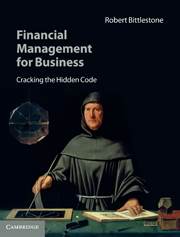Book contents
- Frontmatter
- Contents
- List of figures
- Introduction
- Acknowledgements
- Part 1 A dream of future wealth
- Part 2 The hidden art of management
- 13 The sweet spot
- 14 Elastic bands
- 15 An offer you can't refuse
- 16 The best of both worlds
- 17 Financial Perestroika on Interstate 95
- 18 Loads of money
- 19 Checkmate
- 20 Acts of God
- 21 Acts of men
- 22 Hubble, bubble, double-entry trouble
- 23 Credit crunch conclusion
- 24 Twenty-first-century accounting
- Appendix 1 Mathematical anchor
- Appendix 2 Getting to grips with cash
- Postscript
- Bibliography
- Index
17 - Financial Perestroika on Interstate 95
from Part 2 - The hidden art of management
Published online by Cambridge University Press: 05 June 2014
- Frontmatter
- Contents
- List of figures
- Introduction
- Acknowledgements
- Part 1 A dream of future wealth
- Part 2 The hidden art of management
- 13 The sweet spot
- 14 Elastic bands
- 15 An offer you can't refuse
- 16 The best of both worlds
- 17 Financial Perestroika on Interstate 95
- 18 Loads of money
- 19 Checkmate
- 20 Acts of God
- 21 Acts of men
- 22 Hubble, bubble, double-entry trouble
- 23 Credit crunch conclusion
- 24 Twenty-first-century accounting
- Appendix 1 Mathematical anchor
- Appendix 2 Getting to grips with cash
- Postscript
- Bibliography
- Index
Summary
There is no perception without contrast.
Franklin Y. GatesIn 1991 two events took place concerning our present theme, one of them of relevance and the other of irreverence. The relevant event was the publication of Harvard Business School Professor Robert Eccles's pioneering treatise ‘The Performance Measurement Manifesto’. This article in Harvard Business Review made a major impact on executives, consultants and academics worldwide and it put the whole area of non-financial performance measurement on the map. It legitimised a new focus on metrics such as Product Quality, Brand Identity, Customer Satisfaction and other ‘business drivers’ and it also implied that companies that concentrated on financial outcomes alone were missing a competitive opportunity.
The article also made a major impact on me: I felt that I had been handed the corner piece to a jigsaw. I met Bob Eccles that spring and we have stayed in touch ever since. He has also worked as an investment capitalist and freelance consultant; in neither of these capacities has he lost any facet of his ability to provoke, enlighten and inspire.
The irreverent event was that I accepted an informal invitation to contribute an article on the interaction between management and technology from J. P. Donlon, then Editor of the New York-based Chief Executive magazine which circulates to that eponymous American readership. What started as a one-off contribution mysteriously turned into a regular monthly column which became christened ‘The Soft Machine’.
- Type
- Chapter
- Information
- Financial Management for BusinessCracking the Hidden Code, pp. 124 - 127Publisher: Cambridge University PressPrint publication year: 2010



